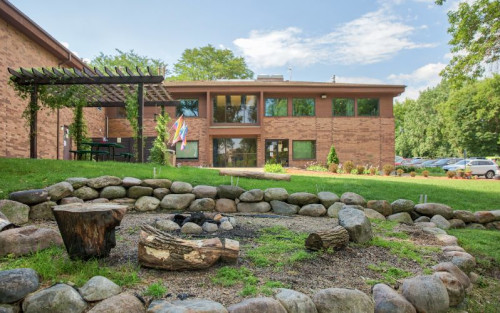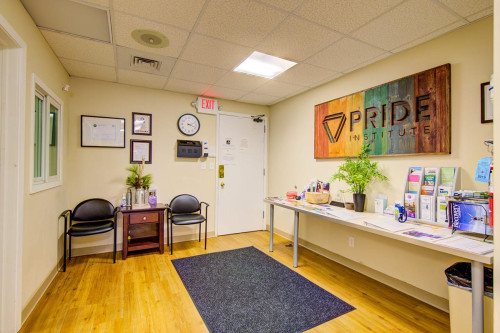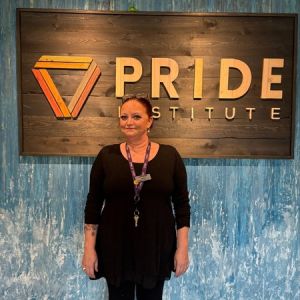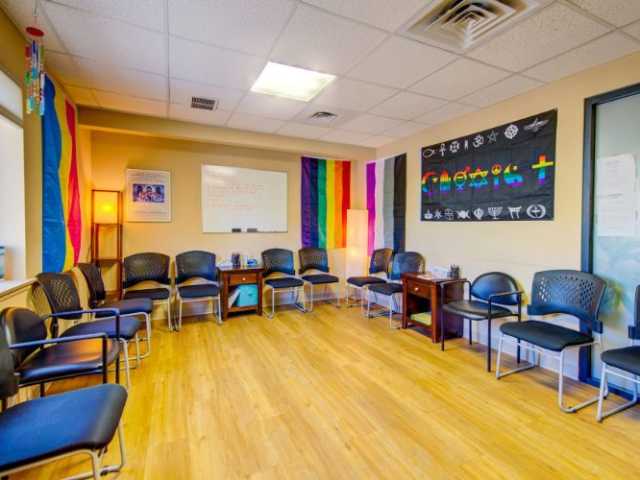






Pride Institute
Verified Center
This provider's information has been quality-checked by Recovery.com's Research Team for accuracy and completeness, including center verification through appropriate third-party organizations.
Treatment Focus
This center primarily treats substance use disorders, helping you stabilize, create relapse-prevention plans, and connect to compassionate support.
Primary Level of Care
Offering intensive care with 24/7 monitoring, residential treatment is typically 30 days and can cover multiple levels of care. Length can range from 14 to 90 days typically.
Treatment Focus
This center primarily treats substance use disorders, helping you stabilize, create relapse-prevention plans, and connect to compassionate support.
Primary Level of Care
Offering intensive care with 24/7 monitoring, residential treatment is typically 30 days and can cover multiple levels of care. Length can range from 14 to 90 days typically.
Provider's Policy
Pride Institute accepts most major forms of insurance, self-pay and Minnesota state funding. We’ll work closely with patients and families to help understand and navigate your insurance co-pay and deductible, if applicable. Unfortunately, we do not accept Medicare or out-of-state Medicaid programs due to our specific licensure.
Pride Institute
Pride Institute
About Pride Institute
Opened in 1986 as a direct response to the HIV/AIDS pandemic, Pride Institute has led the way in helping LGBTQ+ folx recover from substance use, sexual health issues like chemsex, and mental health conditions. Their residential, day treatment, and intensive outpatient programs provide a safe space and tools to overcome addiction no matter how clients identify within the LGBTQ+ community. Clients join a community that understands the unique experiences and challenges of the LGBTQ+ journey.
Achieve a Healthier Outlook with Tailored Therapies
Pride Institute ensures each client’s treatment aligns with their needs, goals, and identity for a meaningful recovery experience. Clients work with a primary counselor to create a tailored plan that may include individual, couple, family, and group therapy, addressing topics like trauma, sexual health, and LGBTQ+ issues. Evidence-based approaches such as cognitive-behavioral therapy (CBT) help clients challenge negative beliefs, develop coping skills, and improve emotional regulation for lasting sobriety.
Receive Competent, LGBTQ+-Affirming Care
While each client’s recovery program is tailored to their individual journey, all programming at Pride is specifically developed for the LGBTQIA2+ community. Their inclusive and affirming environment removes barriers often found in non-LGBTQ+-specific treatment settings, ensuring clients receive 24/7 support from knowledgeable staff and peers who understand their experiences.
Stay Connected to Fellow Alumnx
At Pride Institute, their alumnx program connects clients with a community that helps each other live the life they’ve worked so hard to achieve in treatment. Events include reunions, speakers, sober activities, and connections with the recovery community on an international level.
Find Healing in a City That Celebrates Diversity
Pride Institute’s main campus is located in a quiet, wooded area with a creek flowing nearby. Their outpatient location is in the heart of a highly artistic and progressive area of the city. The Twin Cities, home to the fifth-largest LGBTQ+ community in the U.S., offers access to LGBTQ+-specific sober housing, LGBTQ+-specific recovery meetings, and a thriving cultural scene. To help clients stay focused on recovery, they do not allow most electronics, such as tablets, recording devices, or digital cameras. Pride Institute arranges travel and covers the costs to ensure clients can access the care they need.

Highlights from the Center
Highlights
These highlights are provided by and paid for by the center.
Customized Treatment Plans
Addiction Recovery
Trauma Treatment
Center Overview
Treatment Focus
This center primarily treats substance use disorders, helping you stabilize, create relapse-prevention plans, and connect to compassionate support.
CARF Accredited
CARF stands for the Commission on Accreditation of Rehabilitation Facilities. It's an independent, non-profit organization that provides accreditation services for a variety of healthcare services. To be accredited means that the program meets their standards for quality, effectiveness, and person-centered care.

Supportive Medication for Recovery
Medication-Assisted Treatment (MAT) is an evidence-based approach that pairs FDA-approved medications with counseling to treat addiction. The medications are used to reduce cravings, ease withdrawal symptoms, or block the effects of substances. More about MAT
Methadone
Naltrexone
Buprenorphine
Note: Treatment centers offer different forms of MAT—such as oral tablets, dissolvable films, or monthly injections—and their policies can vary based on state regulations, provider preferences, and insurance coverage. Because of these differences, it's best to contact the center directly to learn what options are available and what might be right for your situation.
Insurance Accepted
Cash Pay Rates
Estimated Cash Pay Rate
Center pricing can vary based on program and length of stay. Contact the center for more information. Recovery.com strives for price transparency so you can make an informed decision.
Meet Your Care Team

Dr. Patrick Zhao (he/him)
Psychiatrist and Medical Director
MD

Div Mehta (he/him)
Chief Executive Officer
MBBS, MBA, MHA

Meena Iyer (she/they)
Director of Nursing
DNP, MN, BA, RN, PHN

Meghan Bang (she/her)
Director of Utilization Management/Compliance
LADC-S

Kaylee Hoaby (she/they)
Director of Marketing and Business Development

Jessica Rice (she/her)
Admissions supervisor

Graham Waitt
Director of Outpatient Services
LADC-S




Levels of Care





Your Care Options
Specializations
LGBTQ+
Addiction and mental illnesses in the LGBTQ+ community must be treated with an affirming, safe, and relevant approach, which many centers provide.
LGBTQ+ only
Those who identify as LGBTQ+ receive treatment for addiction and mental health with others in the community, making treatment highly relevant and effective.
LGBTQ group
Group therapy unites LGBTQ+ patients in a safe and culturally competent setting, encouraging peer support under the expert leadership of a therapist.
Chemsex
Also called Party 'n' Play (PnP), chemsex refers to using drugs, like methamphetamine, to enhance sexual activity.
Who We Treat
LGBTQ+
Addiction and mental illnesses in the LGBTQ+ community must be treated with an affirming, safe, and relevant approach, which many centers provide.
LGBTQ+ only
Those who identify as LGBTQ+ receive treatment for addiction and mental health with others in the community, making treatment highly relevant and effective.
Conditions We Treat
Chemsex
Also called Party 'n' Play (PnP), chemsex refers to using drugs, like methamphetamine, to enhance sexual activity.
Languages
Care Designed for Your Needs
Special Considerations
LGBTQ group
Group therapy unites LGBTQ+ patients in a safe and culturally competent setting, encouraging peer support under the expert leadership of a therapist.

What people are saying
Treatment
4.0
Accommodations
3.8
Food & Nutrition
3.5
Value
3.9
Adrien T.
Treatment in 2021 • (45 days) • Reviewed 11/30/22
Former Client
•Behavioral Health Tech
Darrell
Reviewed 09/29/25
Review from Rehabs.com
Peter
Reviewed 11/20/19
Review from Rehabs.com
Anonymous
Reviewed 06/21/16
Review from Rehabs.com












